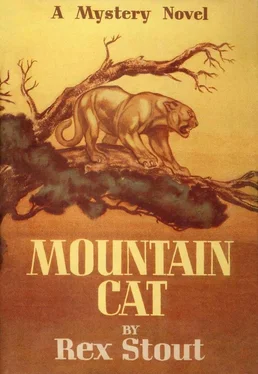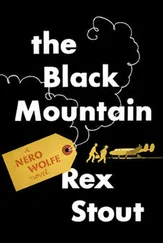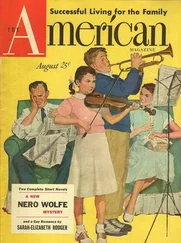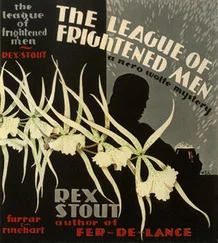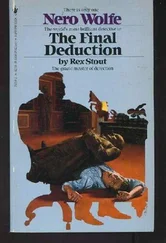In the rear was clutter and chaos. Amid a stack of discarded mounting frames of rusty wire, weeds grew up to a man’s belt. Bales encased in burlap were stacked under the rickety steps. Packing boxes of all sizes and conditions were scattered around, and weeds were everywhere. Delia took it in with a swift glance, and saw that one of the packing boxes, a long narrow one, needed to be shifted only a few feet to serve her purpose. She grabbed a corner of it and tugged, got it moved, and upended it, propping it against the wall of the building. Then she scrambled up. It teetered and nearly fell, but she lunged to seize the window sill above her, got it balanced again, and pulled herself upright so that the window sill was at the height of her breasts. She saw that the window was open and the screen was apparently unfastened, and was trying to get purchase with her finger nails under the frame of the screen, when she nearly toppled off at the sound of a sharp call from somewhere behind her: “Hey there!”
She twisted her head and saw a man in a back yard among tomato vines. She waved a hand, clinging to the window sill with the other, and called, “Okay! The human fly! Free seats in the grandstand!”
“You’ll fall and break your neck!”
“Oh, no! You just watch!”
She stood a moment, her brain whirling. But why stop for that? Why stop for anything? She got her nails under the frame again, broke one prying it up, squeezed the tips of her fingers in the slit, exerted all her strength, and the screen went up with a bang. The rest was easy. Taking a firm grip with both hands inside, she leaped up and dived through, hung there an instant, wriggled on, and flopped onto the floor. She scrambled to her feet, waved from the window to reassure the horticulturist, and closed the screen. Her heart was a hammer on the wall of her chest. Four steps took her to the workbench, where a miscellany of tools were arrayed in slotted cleats. She had long ago been permitted to play with many of those tools, though never the sharp knives; now a knife with a long sharp blade was what she took. With it in her hand she went to the door at the end of the partition and passed through it into the large front room. She had thought, anticipating this moment, that now she would go to the foot of the stairs and call his name, to make sure he wasn’t above in his living quarters, but the momentum of her urgency abandoned that precaution. Without even a glance at the stairs, she went swiftly to the mountain cat on the platform in the center of the room, the cougar with his paw resting on the carcass of a fawn; and, throwing herself on her back underneath its belly, ripped the tough hide with a savage sweep of the knife. But it was well mounted and there was only a slit, so she wriggled her shoulders and slashed crosswise, once, twice, three times. She seized the corners and jerked at the flaps, and the hole gaped open, and objects tumbled out and fell on her face and shoulders, and she squirmed away as if they had been deadly snakes, though a glance showed her that they were money, currency, packets of twenty-dollar bills. Her heart was hammering her chest.
A voice came: “ Del! ”
Her heart stopped. She became rigid, there under the mountain cat on her back. She was aware of steps, a hand touching her, fingers gripping her ankle, and she jerked her leg away, rolled over, rolled from under the mountain cat, causing two of the bundles of bills to fall from the platform, and was on her feet. Quinby Pellett stood there, looking at her, his face pale and contorted, his lips twisted like those of a child trying not to cry. “So,” he said.
She nodded her head without knowing it. “So,” she said.
“Del.” His hand lifted, fluttered, and dropped again. “Godamighty.”
She was looking at his middle, where a fold of his untidy shirt was escaping from his belt. She couldn’t look at his face. Involuntarily she took a sidewise step, and another one. He moved toward her.
“Where you going?”
There was a noise from her throat, but no word.
“Nowhere,” he said; and, apparently satisfied that the command was sufficient, he stooped to pick up the two bundles of bills and lay them on the platform. Seeing the knife there under the cougar, he picked that up too and held it in his hand, not as one arming himself but rather, automatically, as a man who doesn’t like to see tools thrown around. He faced her again. “Who sent you here?”
She shook her head. “Nobody.” Her voice was a croak in her ears. “I came alone. When I was climbing in a man saw me—”
“I know he did. I heard him, from upstairs. I heard you, too. I was behind the moosehide when you came in here. I wanted to see — but you acted too quick before I could stop you.” He glanced at the platform. “I know why you did that. The way you saw me looking at it the other day. You’ve got a brain like mine, you don’t miss things. You remembered how I looked at it that day, didn’t you?”
She nodded without knowing it.
He nodded back. “Sure you did. I know how your brain works. I was afraid it might. Since Toale came to me yesterday and showed me the bill he had that I gave him Easter time, and I was afraid the one I gave you for your birthday was the same kind, and if you looked at it you would know because Toale had told you. I was afraid your brain would work that way, but I didn’t move the money because I knew if you had that bill I knew you would find out some day and I didn’t want to wait for it. I didn’t want it to be like it was with your mother, when I knew she knew, but I didn’t know how and I didn’t know how much—”
Delia gasped, “Mother knew?”
“Sure she did. Toale told her.” A spasm went over Quinby Pellett’s face and left it distorted. “He didn’t believe in the vengeance of man. He wanted to drive vengeance from her heart, and he wanted her to persuade me to repent to God. What he did was drive her to suicide. She wouldn’t — she couldn’t tell me about it. He told me yesterday, and showed me that bill, because he knew I had killed Jackson, too.”
Delia wanted to tell him to stop talking. She felt her knees giving. The edge of the platform was there and she sank, sitting on it. “Oh, don’t!” she pleaded.
“Don’t what, don’t talk?” Pellett demanded with sudden ferocity. He gestured with the knife. “Godamighty, Del, I’ve got to talk, to you. It’s you I’ve got to talk to. Because it was an awful thing I did, but I didn’t mean to. Of course I didn’t have it worked out to use your gun until after I took it away from that fellow that stole it from your car. Then I saw how good it would be to do that. I put the handbag with the gun in it under the seat of my car before I went in there and went up the stairs and got a piece of ore from the bin and hit myself with it. Later I found there were no cartridges, but my own gun’s a .38 and I had some. That night I thought it would be good to leave the gun there and the handbag on the desk, because I supposed naturally you’d be with Clara and maybe other people and your alibi would keep you out of it, and it would be good for me because everybody would know that I never in God’s world would frame you. Then you went right there to the office and Hurley found you there. That was terrible. That made me feel worse than anything. Except...” The spasm distorted his face again. “Except your mother,” he said.
Delia couldn’t look at him. Her eyes gazed straight, at their own level as she sat, at the long-bladed knife in his hand.
“Except for your mother,” he said harshly, “I’ve never repented, Del. I want to be honest with you. I’ve never repented about your father. You’ll hate me now. I hated him. He was full of life and full of success. Then that talk started about him and Amy Jackson. I didn’t know then how much was behind it and I don’t know now and I don’t give a damn. When I asked your mother she wouldn’t discuss it. A man has no right to live so there can be such talk. My own sister wouldn’t discuss it with me. I put it to him, to his face, and he laughed at me. He always did laugh at me. I was his brother-in-law, and he’d let me have a little money now and then because I couldn’t make a go of this taxidermy business, but what he really thought, he regarded me as a bum. You know he did.”
Читать дальше
